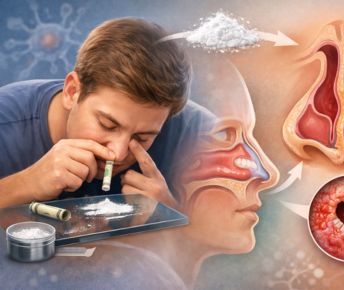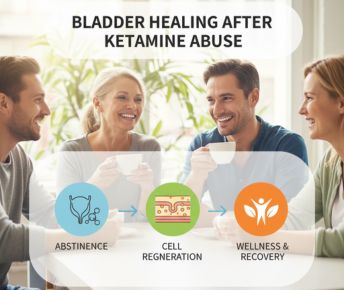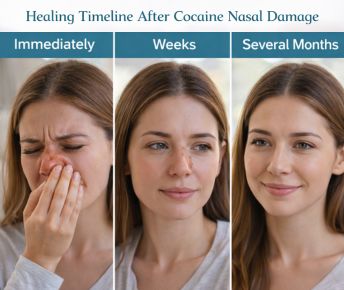Everybody experiences stress differently, and it can result from a wide range of life experiences. Stress can exacerbate health disorders like addiction, regardless of whether it stems from recent or substantial traumatic experiences in the past. Stress can take many forms, including physical, emotional ones. It can arise from unexpected difficulties as well as the ordinary dictations of daily obligations. Almost every system in your body is impacted by stress. Prolonged stress causes major health issues.
How are Stress and Addiction Related?
Stress and addiction each influence and exacerbate the other. Individuals experiencing chronic stress often find themselves seeking relief or escape, and for some, substances like drugs or alcohol become a means to temporarily alleviate the overwhelming pressure. On the flip side, the use of addictive substances can also contribute to increased stress levels, creating a self-reinforcing cycle that is challenging to break.
Physiological Responses:
Stress causes the body to relinquish stress hormones like cortisol, which primes the body for the "fight or flight" reaction. In the context of addiction, this ascended state of arousal can have both positive and negative effects. On the one hand, it could heighten the euphoric effects of some drugs, incrementing their attractiveness as a coping strategy. Conversely, long-term stress pathway activation may lead to altered encephalon chemistry and heightened susceptibility to addictive comportments.
The "fight-or-flight" replication is another term for this set of replications to stress that evolved as a survival strategy to avail people respond swiftly to life-threatening circumstances. One can fight off the threat or escape to safety thanks to the well orchestrated, virtually immediate sequence of hormonal changes and physiological reactions. Regrettably, the body can additionally overreact to non-life-threatening stressors like traffic delays, strain at work, and family issues.
Over time, scientists have gained understanding of the long-term consequences chronic stress has on both physical and psychological health, in integration to understanding how and why these reactions take place. The body ineluctably suffers from frequent activation of the stress replication.
According to research, long-term stress raises blood pressure, inspirits the buildup of deposits that clog arteries, and alters encephalon chemistry, which may be linked to addiction, apprehensiveness, and melancholy. Supplemental preliminary evidence betokens that long-term stress may withal play a role in inordinate corpulence, either directly (by incrementing food intake) or indirectly (by lowering physical activity and slumber).
Psychological Factors:
Negative feelings like solicitousness and despair brought on by stress may enhearten people to endeavor utilizing drugs as a kind of self-medication. Furthermore, the capricious and uncontrollable nature of stressful circumstances can undermine a person's confidence in their own facilities, which in turn intensifies their dependence on addictive drugs as an expedient of regaining control.
Trying to Escape and Other Adaptive Strategies:
Addiction is frequently utilized as a coping strategy to evade the unpleasant consequences of stress. An erroneous sense of tranquility or a transitory numbing of emotional anguish are the reasons why people turn to narcotics, whether they are brought on by marital difficulties, work-cognate stress, or financial instability. Kenning this coping strategy is essential to engendering therapies that efficaciously target the underlying causes of addiction.
Vulnerability
Due to a variety of sensitivity characteristics, some people may be more vulnerably susceptible to the stress-addiction relationship than others. Pre-subsisting mental health issues, childhood trauma, and genetic predispositions can all compound the effects of stress and raise the peril of addictive comportment development. Understanding these elements is crucial to engendering individualized treatment programs that meet each patient's particular requisites.
Ending The Cycle:
A comprehensive strategy that addresses both the internal susceptibilities and the external stresses is compulsory to break the cycle of stress and addiction. Healthy coping mechanisms can be provided via mindfulness therapies, stress management strategies, and cognitive-behavioral therapy. Furthermore, building resilience and a solid support network might be essential in availing people in surmounting stress-cognate obstacles without turning to addictive substances.
Stress and the Development of Sexual Addiction:
Both acute and chronic stress force people to develop a variety of coping strategies in order to get through the difficulties of life. As a vi;rous and innate human propensity, sex is frequently utilized as a stress-palliating technique. This link between utilizing sex as a coping mechanism and stress opens the door to the possibility of developing a sex addiction.
Susceptibility brought on by stress sets the stage for the development of sex addiction. People who are under an abundance of stress could turn to sexual activities as a short-term way to decompress. Sexual activities are alluring because they offer instant gratification and diversion, which can reinforce a vicious cycle and ineluctably result in compulsive and addictive deportments.
The body's stress-replication mechanism, which includes the relinquishment of cortisol and adrenaline, is triggered by stress. The encephalon's reward system, in particular the mesolimbic dopamine pathway, is impacted by these stress chemicals. The relationship between stress and the desire for sexual fulfillment is mostly influenced by the reward system, which is essential for reinforcing comportment.
The intricate network of encephalon regions known the limbic system is essential for controlling sexual and stress-cognate replications. Understanding how stress and sex addiction may become proximately cognate depends on a construal of the roles played by the hypothalamus, which controls hormone replications, and the amygdala, which processes emotions. The perpetuation of obsessive sexual practices as a stress-minimization strategy can be attributed to limbic dysregulation.
Maladaptive coping strategies often emerge in response to stress, with sex serving as a potent form of escapism. The immediate pleasure derived from sexual activities may create a temporary respite from stressors, reinforcing the association between stress relief and sexual behaviors.
Co-Occurrence with Mental Health Disorders:
The relationship between stress and sex addiction is further complicated by the co-occurrence of mental health disorders. Stress-related disorders, such as anxiety and depression, commonly accompany sex addiction, creating a feedback loop where one exacerbates the other.
VI. Therapeutic Interventions:
A. Comprehensive Treatment Approaches:
An all-encompassing strategy is needed to address the complex relationship between stress and sexual addiction. The going of therapeutic methods including dialectical behavior therapy (DBT), cognitive-behavioral therapy (CBT), and psychopharmacological treatments is to separate the entwined elements that lead to sex addiction and stress.
B. Relapse Prevention and Coping Skills:
Therapy frequently fixates on edifying patients healthy coping mechanisms and stress-abbreviation techniques in integration to treating the acute symptoms of sex addiction. Relapse obviation strategies are essential for severing the link between stress and addiction and promoting long-term recovery. Through a construal of the physiological reactions, psychological dynamics, and susceptibility variables involved, we can engender more potent preventative, intervention, and long-term rehabilitation techniques.
How can Samarpan help you?
Samarpan offers talk therapy as well as physical well-being enhancements to avail clients manage stress. This is not just a subsidiary way to avail adults deal with stress; it's additionally a great way to help athletes, students, the elderly, and even adults. Moreover, customary physical activity, such as exercise, is a simple and plausibly priced strategy to manage daily stress.
We can only expect to unravel the web of stress and addiction by taking a comprehensive and nuanced approach, enabling people to take back control of their lives and engender a path towards long-term health.
Samarpan is a specialized international Substance Use Disorder (De-Addiction) and Process Addiction rehab in Pune, India that accepts a maximum of 26 clients. We only accept clients on a voluntary basis and have a highly structured program that encompasses the most effective approaches to Substance Use Disorder and addiction. The facility is set in the rolling hills Mulshi, with clients having either individual or shared rooms, in a modern resort-like facility, staffed by Internationally Accredited Professionals. Samarpan is fully licensed under The MSMHA and is also an accredited ;RSKI-CENAPS Centre of Excellence offering a program from 5 to 13 weeks.
If you or someone you care about is considering treatment for substance use disorder or process addictions, we can help. Contact us now on admissions@samarpan.in or phone/WhatsApp us on +91 81809 19090.
























 Yes, many offer serene environments and solid therapeutic frameworks. However, quality varies, so it’s essential to research accreditation, staff credentials, and therapeutic depth.
Yes, many offer serene environments and solid therapeutic frameworks. However, quality varies, so it’s essential to research accreditation, staff credentials, and therapeutic depth.




